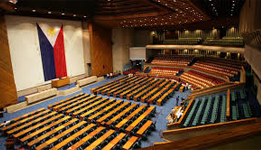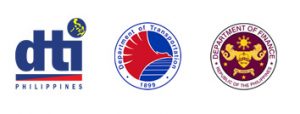 A forum on “Moving Towards Quality Non-Tariff Measures (NTMs) was conducted to advance the goal of quality NTMs in the country, its relevance, and issues stemming from it. It aims to provide updates on measures taken by the government arising from the results of the business survey on NTMs conducted by the International Trade Center (ITC) in 2016, collaborate with key private sector stakeholders on moving towards quality NTMs noting current industry accounts on trade facilitation. In addition, it also aims to foster knowledge and experience sharing among different government agencies that carry out NTMs and its formulation and implementation. Finally, to review the current governance and set gears for an inter-agency collaboration on NTMs.
A forum on “Moving Towards Quality Non-Tariff Measures (NTMs) was conducted to advance the goal of quality NTMs in the country, its relevance, and issues stemming from it. It aims to provide updates on measures taken by the government arising from the results of the business survey on NTMs conducted by the International Trade Center (ITC) in 2016, collaborate with key private sector stakeholders on moving towards quality NTMs noting current industry accounts on trade facilitation. In addition, it also aims to foster knowledge and experience sharing among different government agencies that carry out NTMs and its formulation and implementation. Finally, to review the current governance and set gears for an inter-agency collaboration on NTMs.
Export Marketing Bureau’s Assistant Director Agnes Legaspi provided the updates on International Trade Center’s 2016 Philippine NTM Survey. According to her, the report showed that NTMs relating to sanitary and phytosanitary (SPS) measures or technical barriers to trade (TBT) issues are the most in number, followed by the rules of origin and customs clearances. The others are burdensome technical measures faced by Filipino exporters such as fumigation requirements, labeling requirements, product certification, and other export requirements. Dr. Thomas G. Aquino’s point of view supports the aforementioned issues, stating that prevalent challenges such as changes in trade practices add up to the difficulties in compliance of the industries to existing legitimate NTMs, thus causing hurdles to businesses. In addition, other issues on NTMs, specifically for chemicals are deemed to be disguised as TBTs.
In order to address the aforementioned issues, and the goal of having quality NTMs for the country, government agencies are carrying out their respective NTM procedures and processes to ease the burden of the exporters as:
a) Tariff Commission (TC) recommended that their agency can collaborate with the University of the Philippines Public Administration Research and Extension Services Foundation, Inc. (UPPAF) Regulatory Reform Support Program for National Development (RESPOND) to improve transparency, accessibility, cooperation, and technical training on quality NTMs through issuance of reports on findings and recommendations for prioritized reforms, and constructing a national registry on NTMs. They also plan on strengthening the role of TC in NTMs policy making by institutionalizing it.
b) Department of Trade and Industry (DTI) – Bureau of Philippine Standards (BPS) will strengthen their role as the country’s National Enquiry Point (NEP) and National Notification Authority (NNA) for World Trade Organization – Technical Barriers to Trade(WTO-TBT). As NEP, their role includes collating TBT Notifications to be routed to relevant stakeholders, and as NNA, to notify the WTO on the technical regulations, conformity assessment procedures from the different government agencies.
c) Department of Health – Food and Drug Administration (DOH-FDA) will be implementing their License to Operate (LTO) and Certificate of Product Registration (CPR) in a much shorter time (20 days) as prescribed by the Anti-Red Tape Authority (ARTA) and Ease of Doing Business and Efficient Government Service Delivery Act.
This forum was organized by the UPPAF in collaboration with Philippine Exporters Confederation, Inc. PHILEXPORT), Tariff Commission (TC), Department of Trade and Industry (DTI), and Export Development Council (EDC). –KJDA

 On March 17, further operational guidelines under the Inter Agency Task Force for the Management of Emerging Infectious Disease (IATF-EID) concerning the implementation of the “Enhanced Community Quarantine (ECQ)”, ordered that “All government agencies in the Executive Branch are hereby directed to issue accreditation orders to identify their respective skeletal workforces for critical services operating during the duration of the enhanced community quarantine in Luzon…”
On March 17, further operational guidelines under the Inter Agency Task Force for the Management of Emerging Infectious Disease (IATF-EID) concerning the implementation of the “Enhanced Community Quarantine (ECQ)”, ordered that “All government agencies in the Executive Branch are hereby directed to issue accreditation orders to identify their respective skeletal workforces for critical services operating during the duration of the enhanced community quarantine in Luzon…” The Department of Agriculture (DA) issued Special Order No. 189, s. 2020, assigning regular personnel of Bureau of Fisheries and Aquatic Resources (BFAR) at the One Stop Export Documentation Center (OSEDC) in Pasay City. Job Order (JO) personnel will also be retained to ensure continuity of service in BFAR-OSEDC.During the Export Development Council (EDC) meeting last 06 February 2020, BFAR informed that the pullout of its JO personnel assigned at the OSEDC is postponed until June 2020. However, the Council argued that the presence of regular BFAR personnel in OSEDC is important to ensure timely issuance of export commodity clearances (ECCs). Data shows that 300 to 400 ECCs are issued every day to exporters of fish and fishery products including shell crafts and ornamental shells. DA Secretary William Dar concurred and instructed BFAR to immediately prepare a Special Order assigning regular personnel and retaining JO personnel in OSEDC.
The Department of Agriculture (DA) issued Special Order No. 189, s. 2020, assigning regular personnel of Bureau of Fisheries and Aquatic Resources (BFAR) at the One Stop Export Documentation Center (OSEDC) in Pasay City. Job Order (JO) personnel will also be retained to ensure continuity of service in BFAR-OSEDC.During the Export Development Council (EDC) meeting last 06 February 2020, BFAR informed that the pullout of its JO personnel assigned at the OSEDC is postponed until June 2020. However, the Council argued that the presence of regular BFAR personnel in OSEDC is important to ensure timely issuance of export commodity clearances (ECCs). Data shows that 300 to 400 ECCs are issued every day to exporters of fish and fishery products including shell crafts and ornamental shells. DA Secretary William Dar concurred and instructed BFAR to immediately prepare a Special Order assigning regular personnel and retaining JO personnel in OSEDC.
 “The services export is continuously growing, thus, total exports are projected to increase in single digit percentage.” Export Development Council (EDC) Executive Director Senen M. Perlada reported during the EDC Meeting last 06 February 2020.
“The services export is continuously growing, thus, total exports are projected to increase in single digit percentage.” Export Development Council (EDC) Executive Director Senen M. Perlada reported during the EDC Meeting last 06 February 2020. The Department of Trade and Industry (DTI) and Department of Agriculture (DA) show strong support to boost export of agribased products with high global demand. Secretary William Dar of the DA during the Export Development Council (EDC) meeting acknowledged that partnership between DA and DTI is significant in order to supply the demand of export market and to develop other potential crops for export.
The Department of Trade and Industry (DTI) and Department of Agriculture (DA) show strong support to boost export of agribased products with high global demand. Secretary William Dar of the DA during the Export Development Council (EDC) meeting acknowledged that partnership between DA and DTI is significant in order to supply the demand of export market and to develop other potential crops for export. EDC lauds the pronouncement made by the Bureau of Customs (BOC) AOCG Deputy Commissioner Edward Dy Buco that stakeholders can expect enhanced trade facilitation with the Bureau in 2021. He added that the Commissioner assures its support towards export growth by prioritizing export-related activities in the Bureau’s 10-Point Priority Program for the upcoming year.
EDC lauds the pronouncement made by the Bureau of Customs (BOC) AOCG Deputy Commissioner Edward Dy Buco that stakeholders can expect enhanced trade facilitation with the Bureau in 2021. He added that the Commissioner assures its support towards export growth by prioritizing export-related activities in the Bureau’s 10-Point Priority Program for the upcoming year. The Export Development Council (EDC) through its Networking Committee on Legislative Advocacy and Monitoring (NCLAM) has prioritized the export sector’s legislative agenda for the 18thCongress to have a more competitive export industry.
The Export Development Council (EDC) through its Networking Committee on Legislative Advocacy and Monitoring (NCLAM) has prioritized the export sector’s legislative agenda for the 18thCongress to have a more competitive export industry. In a recent pronouncement, DTI Secretary Ramon Lopez stated that the Departments of Trade and Industry, Transportation and Finance will issue the Joint Administrative Order (JAO) that will regulate local charges imposed by international shipping lines.
In a recent pronouncement, DTI Secretary Ramon Lopez stated that the Departments of Trade and Industry, Transportation and Finance will issue the Joint Administrative Order (JAO) that will regulate local charges imposed by international shipping lines.
 As the fourth industrial revolution or Industry 4.0 gain momentum, the National Wages and Productivity Commission (NWPC), an attached agency of the Department of Labor and Employment (DOLE), focused its 2018 National Productivity Conference on people-centric technologies & innovation for MSMEs. DOLE Undersecretary Ciriaco Lagunsad, III pointed out that the on-going concern on inflation can also be addressed by improving the productivity of producers which will influence prices. As such, he emphasized the need to embrace new technologies, but put people in control of technology.
As the fourth industrial revolution or Industry 4.0 gain momentum, the National Wages and Productivity Commission (NWPC), an attached agency of the Department of Labor and Employment (DOLE), focused its 2018 National Productivity Conference on people-centric technologies & innovation for MSMEs. DOLE Undersecretary Ciriaco Lagunsad, III pointed out that the on-going concern on inflation can also be addressed by improving the productivity of producers which will influence prices. As such, he emphasized the need to embrace new technologies, but put people in control of technology.